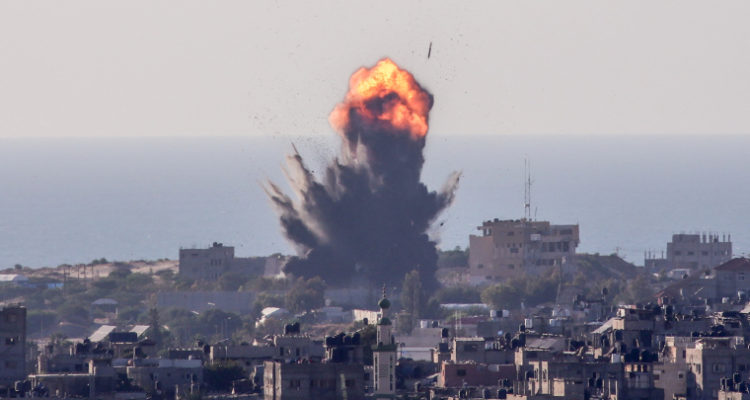Two current attempts to eliminate Muhammad Deif join several other failures over the last 23 years.
By Batya Jerenberg, World Israel News
The elusive head of Hamas’ military has twice managed to escape the IDF so far in Operation “Guardian of the Wall,” according to Hebrew media reports, although 160 of his comrades have not.
Muhammad Deif, the longtime commander of the Izz ad-Din al-Qassam Brigades, has been in hiding for years.
He threatened Israel in a recorded message right before Hamas began its rocket barrages on Israel 10 days ago, saying, “This is a final and clear warning to the occupiers” that if the “aggression against our people does not stop in Sheikh Jarrah at once, we will not stand idly by and the enemy will pay dearly.”
The Hamas leader was posturing as the defender of Jerusalem in general, and in particular of Arab squatters in the eastern Jerusalem neighborhood also known as Shimon HaTzaddik, who have been threatened with eviction for years of nonpayment of rent to their Jewish landlords.
Rioting by Arabs in the area, as well as on the Temple Mount, preceded the Gazan missile attacks that have so far claimed the lives of 10 Israelis and injured over 300.
It was the first time his voice was heard in public since Israel invaded Gaza in 2014’s Operation Protective Edge, when another IDF assassination attempt missed him but killed his wife and two of his children.
A Channel 12 report enumerated four previous attempts on Deif’s life as well. This included an ambush on the Egyptian border in 1998, from which he escaped, and Hellfire missiles shot at his moving car in 2002, badly injuring him.
In 2003, the IDF actually had the opportunity to assassinate most of Hamas’ leadership, including Deif, that had gathered for a meeting, said MK Avi Dichter, who headed the Shabak in the early 2000s.
It was “the best opportunity we ever had – and would ever have” to get them all at once, he said. But the political echelon nixed going full force in the operation due to the fear of civilian casualties. As a result, only a quarter ton of explosives was dropped on the second floor of the building when the meeting was on the first floor, and Deif escaped death again.
In 2006, the Air Force struck again, hitting the apartment he was hiding in. This time, one arm and leg were amputated, but he did not quit.
His survival has made him into a mythic figure in Palestinian circles, the report said.
“The first person whose name those hundreds of young Palestinians chanted in the courtyard of Al Aqsa [during the Temple Mount riots] was Muhammad Deif,” said Avi Issacharoff, Arab Affairs commentator for Maariv. “He is the one who is leading the war right now, he’s responsible for the buildup of their strength.”
“Mohammad Deif is very involved in the military planning, the military cruelty of the terror against Israel,” said Dichter. “He plays a central role. He’s a military man with every fiber of his being, a figure whom people listen to closely.”
Deif grew up in the Khan Yunis refugee camp. He was arrested in 1989 and sent to prison for 16 months for his involvement at age 24 in the First Intifada, and upon his release he began his rise to power.
“He was an indiscriminate, vile murderer, killing without mercy,” said Dr. Yom Tov Samia, former head of Southern Command.
“What set him apart was his interpersonal abilities,” explained Adi Carmi, a former Shin Bet operative. “He was involved in the worst of the worst – the activities of the suicide bombers. He managed to disrupt the connection between the left and right sides [of the brain] of a candidate for suicide and convince him to commit a suicide attack.”
Dichter said that in 1996 Israel also frittered away “a golden opportunity” to get rid of Deif on the same day the Shin Bet killed chief Hamas bombmaker Yahya Ayyash, but “unfortunately the political echelon did not authorize his assassination.”
Deif then unleashed a wave of suicide bomber attacks on buses, restaurants and shops that killed hundreds of Israelis.
The IDF has managed in this round to damage its major enemy in at least one way. The maze of tunnels under Gazan cities that protect Hamas operatives from prying Israeli eyes has been Deif’s major project for years, said Carmi. This maze, which the IDF calls “the Metro,” has been the principal target of the IAF in recent days, and dozens of kilometers have been destroyed in heavy air attacks.
“This whole project, in which years and … hundreds of millions if not billions have been invested, has gone down the drain,” he said.
Dichter, for his part, believes that one day the IDF will succeed in getting the man who heads its Most Wanted list. “Every dog has its day,” he said. “His day will also come.”





